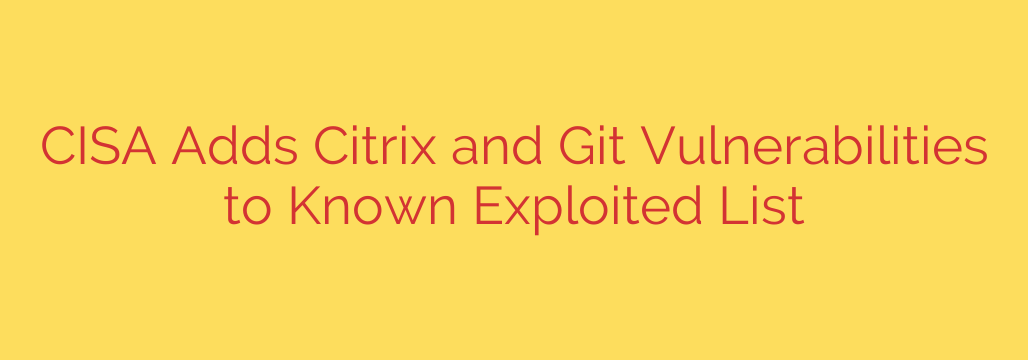
Urgent Security Alert: CISA Confirms Active Exploits of Critical Citrix and Git Vulnerabilities
The US Cybersecurity and Infrastructure Security Agency (CISA) has issued a critical warning by adding two significant vulnerabilities affecting Citrix and Git to its Known Exploited Vulnerabilities (KEV) catalog. This action serves as a stark reminder for all organizations to prioritize immediate patching, as inclusion in the KEV catalog confirms that these security flaws are being actively exploited by malicious actors in the wild.
Federal agencies are mandated to apply patches by July 4, 2024, but this deadline should be seen as a final call to action for private sector organizations as well. Waiting is not an option when facing threats with a proven track record of exploitation.
Let’s break down the two critical vulnerabilities that demand your immediate attention.
1. Critical Citrix Flaw Enabling Data Theft (CVE-2023-24489)
This high-severity vulnerability affects the Citrix ShareFile storage zones controller, a tool used by many businesses for managing and sharing files. The flaw allows for unauthenticated remote code execution (RCE), meaning an attacker can run malicious code on a vulnerable server without needing any login credentials.
- Vulnerability: CVE-2023-24489
- Affected Software: Citrix ShareFile storage zones controller
- Impact: Unauthenticated remote code execution, leading to complete system compromise and data theft.
This vulnerability is particularly dangerous because it opens the door for devastating cyberattacks. Security researchers have linked exploits of this flaw to data extortion campaigns carried out by notorious ransomware groups. Attackers can leverage this access point to steal sensitive corporate data and then demand a ransom to prevent its public release. If your organization uses Citrix ShareFile, this vulnerability must be treated as a top-priority security risk.
2. High-Severity Git Vulnerability Putting Developers at Risk (CVE-2024-32002)
The second vulnerability added to the KEV catalog impacts Git, the world’s most popular version control system. This flaw poses a significant threat to software developers and anyone working with code repositories.
The vulnerability allows for remote code execution when a user clones a malicious repository onto a case-insensitive file system, which is the default for both Windows and macOS. The attack is triggered during the cloning process, specifically through the handling of submodules.
- Vulnerability: CVE-2024-32002
- Affected Software: Git
- Impact: Remote code execution on a developer’s machine when cloning a malicious repository.
An attacker can craft a special repository that, once cloned, executes arbitrary code on the victim’s computer. This could lead to stolen credentials, compromised development environments, and the injection of malicious code into legitimate software projects, creating a widespread supply chain risk.
Why CISA’s KEV Catalog Matters to Everyone
CISA’s KEV catalog is not just a list of potential threats; it is a definitive guide to the vulnerabilities that attackers are actually using to compromise systems. For any organization, regardless of size or industry, the KEV catalog should serve as a prioritized “must-patch” list.
When a vulnerability is added, it means:
- There is reliable evidence of active exploitation.
- The risk is immediate and not theoretical.
- The vulnerability presents a clear and present danger to network security.
Ignoring these warnings exposes your organization to attacks that have already proven successful against other targets.
Actionable Security Recommendations
To protect your organization from these and other actively exploited threats, it is crucial to take immediate and decisive action.
Identify and Patch Immediately: Your first step should be to determine if your systems are running vulnerable versions of Citrix ShareFile storage zones controller or Git. If so, apply the necessary security patches provided by the vendors without delay.
Prioritize KEV Vulnerabilities: Treat every entry in CISA’s KEV catalog as a high-priority alert. Integrate this catalog into your vulnerability management program to ensure you are always addressing the most urgent threats first.
Practice Safe Repository Cloning: For developers, exercise extreme caution when cloning repositories from unknown or untrusted sources. Vet the source of a repository before downloading its contents to your local machine.
Monitor for Suspicious Activity: Review your security logs for any signs of compromise related to these vulnerabilities, such as unusual network traffic or unauthorized access attempts targeting your Citrix or development environments.
The inclusion of these Citrix and Git flaws in the KEV catalog is a clear signal that the time for action is now. Proactive patching and vigilant security practices are your best defense against attackers who are actively working to exploit these known weaknesses.
Source: https://securityaffairs.com/181551/uncategorized/u-s-cisa-adds-citrix-session-recording-and-git-flaws-to-its-known-exploited-vulnerabilities-catalog.html








